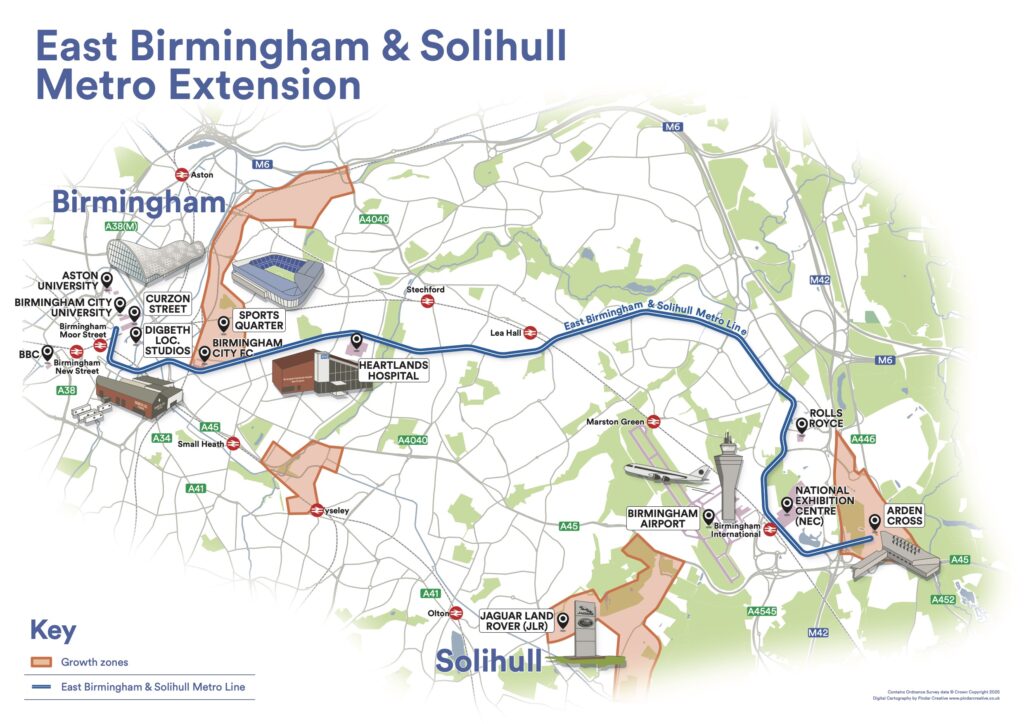East Birmingham is poised for a transformative regeneration as funding has been secured for a brand-new tram route. This crucial infrastructure project is set to significantly improve local connections and unlock billions of pounds in private sector investment, kickstarting the city’s ambitious Sports Quarter development
The funding forms part of a substantial £2.4 billion Government boost to the West Midlands transport network, announced today by Chancellor Rachel Reeves. This commitment follows extensive discussions between the Government, the Mayor of the West Midlands, and Birmingham City FC owner Tom Wagner, whose Knighthead company is ready to inject billions into the area through its Sports Quarter project.
The new Metro extension is considered the pivotal key to unlocking Knighthead’s extensive investment plans. These plans aim to unleash the untapped economic potential of East Birmingham, helping to combat poverty in one of the UK’s most deprived areas by creating thousands of jobs and new opportunities for local residents. The project is also expected to catalyse a wider £3 billion in investment, delivering more than 1,500 new homes and generating over 8,000 jobs.

At the heart of the Sports Quarter project is a proposed new 60,000-seat stadium for Birmingham City FC, to be built on the Birmingham Wheels site in Bordesley. This will be complemented by a sports campus featuring training facilities, a new academy, and community pitches, all directly served by the new Metro tram route.
The East Birmingham Metro Extension will offer fans a fast and reliable connection between the city centre and the new stadium. Crucially, it will also enhance travel connections for local people, opening up access to new job markets, leisure facilities, and learning opportunities. The route will seamlessly connect to the Eastside extension, currently under construction, serving key locations such as Millennium Point, Birmingham City University, the Curzon Street HS2 station, and Digbeth – home to the new BBC Tea Factory and Steven Knight’s Digbeth Loc. Studios.
Furthermore, this extension will serve as a springboard for long-term plans to extend the tram line from the Sports Quarter through the east of the city to North Solihull, encompassing the airport, NEC, HS2 Interchange, and the surrounding Arden Cross regeneration zone.
The Mayor of the West Midlands said: “This funding means we can now deliver a new Metro line to the Sports Quarter – connecting it to Birmingham city centre and unlocking one of the most significant private investments our region has ever seen. But this is just the beginning. This investment unlocks a nationally significant infrastructure project that will transform East Birmingham and North Solihull into one of the UK’s key growth corridors – driving thousands of new homes and jobs and bringing opportunity to communities that have been held back for too long.”
Wider plans to extend the tram route from the Sports Quarter to the airport are anticipated to unlock even greater investment and growth across East Birmingham and North Solihull. This will bring tangible change for local people through improved jobs, better homes, and enhanced life opportunities. Such an expansion could unleash around £10 billion of private investment, 55,000 new jobs, and 7,700 homes, directly addressing long-standing inequalities in the area.
The East Birmingham & Solihull tram extension promises a multitude of benefits for local people and businesses:
- Faster travel and better connections between key locations for work, leisure, healthcare, and learning.
- Less congestion along one of the region’s vital routes into and out of the city centre.
- New homes near tram stops, offering affordable, sustainable, and opportunity-proximate living.
- The emergence of cafés, shops, and start-ups in previously underserved neighbourhoods.
- Safer, greener streets, complemented by new parks and dedicated spaces for walking and cycling.
- A renewed sense of pride returning to local communities, fostering a new sense of possibility for families and young people.




